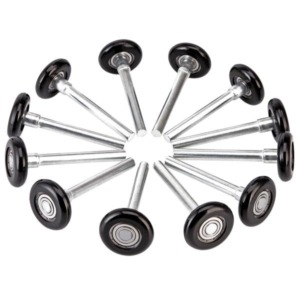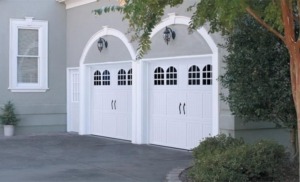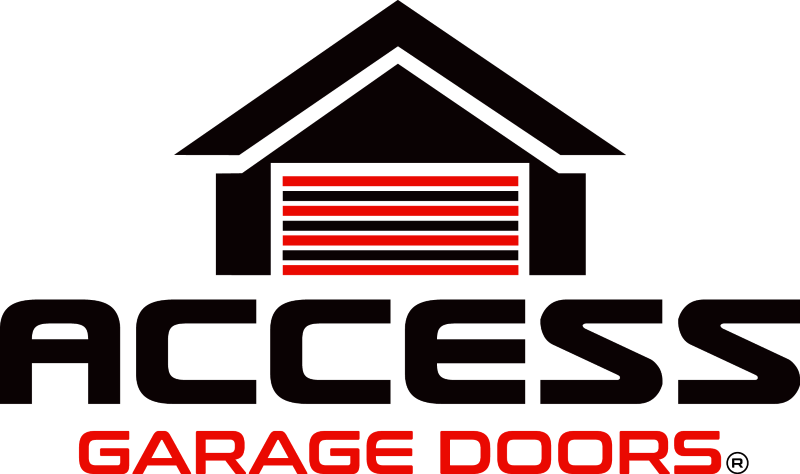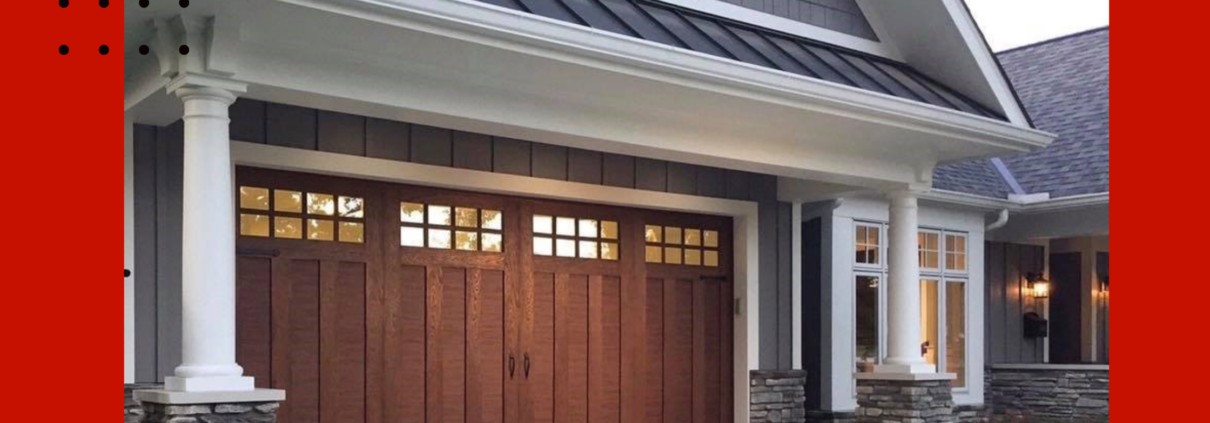We think it is safe to say that the average American homeowner probably hasn’t thought twice about the key components that allow their garage door to function. Most people are not quite sure what a garage door roller looks like, let alone what they do or how they work. It pays to learn a little bit about these simple but essential devices since they’re a key part of what keeps your garage door moving. Having quality rollers that are professionally installed and well maintained makes a big difference in how smoothly your garage door functions and how much noise it makes as it opens and closes. In today’s blog, we walk you through the basics of garage door rollers and share some of our best practices and advice to ensure you garage rollers stay in great condition for as long as possible.

What are garage door rollers and how do they work?
Garage door rollers are the wheels that run along the metal tracks on the sides of your garage door. When you open your garage door, the rollers slide up the track to lift the door until it fully retracts. When you close the door, the process happens in reverse. Each roller is composed of a wheel and a metal rod that’s attached to the frame of the door. If the rollers are not completely in line with the track, or if they’re not well lubricated, they can make it difficult for the door to open without jerking, sticking, and making excessive noise.
Are there different types of garage door rollers available?
Roller types vary in terms of the type of materials used to make their wheels. At Access Garage Doors we carry a large variety of garage door parts and accessories to ensure your door is functioning at its best. Here’s a quick overview of the different types of garage door rollers:
-
Plastic rollers

- Rollers with plastic wheels are the most affordable option, but they’re not as long-lasting as other wheel types. Plastic rollers can only support a limited amount of weight, so they’re best suited for single-panel garage doors on residential homes.
-
Steel rollers
- Rollers with steel wheels can support more weight than plastic rollers. Although they can sound louder, steel rollers are a reliable and durable option for most garage doors.
-
Nylon rollers
- Many garage door experts recommend investing in rollers with nylon wheels. As the most recent type to become available to consumers, nylon rollers are lightweight like plastic rollers but can support large amounts of weight like steel rollers. These garage door rollers slide along the tracks more fluidly and quietly than other types of rollers.

The quality and cost of garage door rollers also depends on whether their wheels contain ball bearings. These ball bearings are rings of small metal balls that separate the rotating wheel and stationary axle to reduce friction. Plastic rollers don’t have ball bearings, and some steel rollers have them while others don’t. Nylon rollers, which resemble rollerblade or skateboard wheels, always have ball bearings. Rollers without ball bearings will wear out more quickly because there’s nothing to limit the friction between the wheel and the rod. The more balls in the bearing, the longer the roller will last and the more smoothly it will run along the track.
At Access Garage Doors, we specialize in quality garage doors that move with the times. If you need to have your garage door rollers inspected, repaired, or replaced, don’t hesitate to contact us today. Our experienced technicians are happy to help.





buying from online mexican pharmacy
https://cmqpharma.online/# mexican pharmaceuticals online
mexican online pharmacies prescription drugs
purple pharmacy mexico price list: mexican online pharmacies prescription drugs – mexico pharmacy
canadian online pharmacy reviews: canadianpharmacymeds – canadian pharmacy no scripts
https://canadapharmast.online/# reddit canadian pharmacy
п»їbest mexican online pharmacies mexican rx online buying prescription drugs in mexico
world pharmacy india: Online medicine order – online pharmacy india
mexico drug stores pharmacies: mexico pharmacies prescription drugs – mexican rx online
https://canadapharmast.com/# northwest pharmacy canada
canadian pharmacy 1 internet online drugstore 77 canadian pharmacy buying drugs from canada
Online medicine order: indianpharmacy com – india online pharmacy
canadian pharmacy king reviews: canadian pharmacy mall – canadian pharmacy victoza
п»їbest mexican online pharmacies mexican border pharmacies shipping to usa mexico pharmacy
buy medicines online in india: online pharmacy india – indian pharmacy
https://foruspharma.com/# п»їbest mexican online pharmacies
mexican mail order pharmacies: medication from mexico pharmacy – medication from mexico pharmacy
https://canadapharmast.online/# canadian compounding pharmacy
mexican drugstore online п»їbest mexican online pharmacies purple pharmacy mexico price list
world pharmacy india: reputable indian online pharmacy – online pharmacy india
indian pharmacies safe: top 10 online pharmacy in india – india online pharmacy
п»їpaxlovid: paxlovid cost without insurance – paxlovid cost without insurance
Paxlovid over the counter: paxlovid generic – paxlovid generic
https://paxloviddelivery.pro/# paxlovid india
http://paxloviddelivery.pro/# п»їpaxlovid
https://paxloviddelivery.pro/# Paxlovid over the counter
paxlovid buy: paxlovid buy – paxlovid buy
https://mexicandeliverypharma.online/# mexico drug stores pharmacies
mexican rx online: purple pharmacy mexico price list – reputable mexican pharmacies online
mexico pharmacies prescription drugs: buying prescription drugs in mexico – mexican pharmaceuticals online
mexico drug stores pharmacies: mexican online pharmacies prescription drugs – mexican pharmaceuticals online
https://mexicandeliverypharma.com/# mexican mail order pharmacies
medicine in mexico pharmacies mexico drug stores pharmacies pharmacies in mexico that ship to usa
mexican rx online: buying prescription drugs in mexico online – п»їbest mexican online pharmacies
medicine in mexico pharmacies: mexican online pharmacies prescription drugs – buying prescription drugs in mexico
medicine in mexico pharmacies: purple pharmacy mexico price list – buying from online mexican pharmacy
buying from online mexican pharmacy: mexican mail order pharmacies – mexican mail order pharmacies
mexico pharmacy buying prescription drugs in mexico online mexican border pharmacies shipping to usa
mexico pharmacies prescription drugs: mexico pharmacies prescription drugs – mexico drug stores pharmacies
medication from mexico pharmacy: buying prescription drugs in mexico online – п»їbest mexican online pharmacies
http://mexicandeliverypharma.com/# mexican online pharmacies prescription drugs
pharmacies in mexico that ship to usa reputable mexican pharmacies online medicine in mexico pharmacies
buying from online mexican pharmacy: mexican border pharmacies shipping to usa – mexican drugstore online
mexican drugstore online: mexican drugstore online – mexican border pharmacies shipping to usa
mexico drug stores pharmacies: purple pharmacy mexico price list – mexico drug stores pharmacies
mexico pharmacies prescription drugs: mexican drugstore online – mexican drugstore online
mexican rx online: mexican border pharmacies shipping to usa – pharmacies in mexico that ship to usa
mexican rx online mexican online pharmacies prescription drugs buying from online mexican pharmacy
purple pharmacy mexico price list: pharmacies in mexico that ship to usa – medicine in mexico pharmacies
pharmacies in mexico that ship to usa: buying from online mexican pharmacy – purple pharmacy mexico price list
pharmacies in mexico that ship to usa п»їbest mexican online pharmacies buying prescription drugs in mexico online
п»їbest mexican online pharmacies: mexico pharmacies prescription drugs – buying prescription drugs in mexico online
buying from online mexican pharmacy: buying prescription drugs in mexico online – purple pharmacy mexico price list
mexico drug stores pharmacies: п»їbest mexican online pharmacies – mexican pharmaceuticals online
mexico drug stores pharmacies mexican border pharmacies shipping to usa mexican pharmacy
mexican pharmaceuticals online: purple pharmacy mexico price list – mexican online pharmacies prescription drugs
buying prescription drugs in mexico online: mexico drug stores pharmacies – buying prescription drugs in mexico
reputable mexican pharmacies online medicine in mexico pharmacies medicine in mexico pharmacies
mexican online pharmacies prescription drugs: buying from online mexican pharmacy – mexican drugstore online
mexican drugstore online: mexican mail order pharmacies – medicine in mexico pharmacies
п»їbest mexican online pharmacies: medicine in mexico pharmacies – buying prescription drugs in mexico online
medication from mexico pharmacy: buying prescription drugs in mexico – buying from online mexican pharmacy
п»їbest mexican online pharmacies: mexican rx online – mexican rx online
mexico pharmacies prescription drugs: mexico pharmacies prescription drugs – mexico drug stores pharmacies
buying prescription drugs in mexico online purple pharmacy mexico price list buying prescription drugs in mexico
mexican online pharmacies prescription drugs: mexico drug stores pharmacies – mexican pharmaceuticals online
mexico pharmacies prescription drugs: purple pharmacy mexico price list – mexican drugstore online
medication from mexico pharmacy: mexican drugstore online – buying prescription drugs in mexico online
mexico pharmacy mexico pharmacies prescription drugs buying prescription drugs in mexico online
mexican online pharmacies prescription drugs: mexican mail order pharmacies – reputable mexican pharmacies online
mexican pharmaceuticals online: mexican pharmaceuticals online – mexican rx online
mexican rx online mexican border pharmacies shipping to usa purple pharmacy mexico price list
medication from mexico pharmacy: mexico pharmacies prescription drugs – buying prescription drugs in mexico online
buying prescription drugs in mexico online: mexico drug stores pharmacies – п»їbest mexican online pharmacies
п»їbest mexican online pharmacies: mexico drug stores pharmacies – purple pharmacy mexico price list
п»їbest mexican online pharmacies: pharmacies in mexico that ship to usa – п»їbest mexican online pharmacies
buying prescription drugs in mexico online: mexico drug stores pharmacies – buying prescription drugs in mexico online
mexico drug stores pharmacies: mexican pharmaceuticals online – mexican mail order pharmacies
mexico pharmacies prescription drugs п»їbest mexican online pharmacies mexico drug stores pharmacies
buying prescription drugs in mexico online: medication from mexico pharmacy – mexican border pharmacies shipping to usa
mexican pharmacy mexico drug stores pharmacies mexico pharmacies prescription drugs
acquistare farmaci senza ricetta: Farmacie online sicure – migliori farmacie online 2024
http://mexicopharmacy.win/# medicine in mexico pharmacies
affordable ed medication
http://indiapharmacy.shop/# Online medicine order
indian pharmacies safe: Online pharmacy – buy prescription drugs from india
https://mexicopharmacy.win/# purple pharmacy mexico price list
pills for ed online
https://indiapharmacy.shop/# mail order pharmacy india
cheap ed
https://indiapharmacy.shop/# best india pharmacy
http://indiapharmacy.shop/# reputable indian pharmacies
best ed medication online: Best ED meds online – buy ed meds
mexico drug stores pharmacies: Best pharmacy in Mexico – medication from mexico pharmacy
https://indiapharmacy.shop/# india pharmacy
https://indiapharmacy.shop/# Online medicine order
order ed meds online: cheap ed pills online – ed treatment online
http://indiapharmacy.shop/# indian pharmacies safe
top online pharmacy india: Best Indian pharmacy – top 10 pharmacies in india
п»їlegitimate online pharmacies india: Online medicine home delivery – indian pharmacy
http://indiapharmacy.shop/# reputable indian pharmacies
cheapest ed meds: Best ED meds online – low cost ed meds online
http://edpillpharmacy.store/# low cost ed medication
indian pharmacies safe: Top mail order pharmacies – top 10 pharmacies in india
https://mexicopharmacy.win/# п»їbest mexican online pharmacies
buying ed pills online: Best ED pills non prescription – ed online treatment
http://indiapharmacy.shop/# best india pharmacy
indian pharmacy: Indian pharmacy international shipping – reputable indian online pharmacy
mexican online pharmacies prescription drugs: Best pharmacy in Mexico – mexico pharmacies prescription drugs
https://indiapharmacy.shop/# top 10 pharmacies in india
top 10 pharmacies in india indianpharmacy com indian pharmacy
online ed medication: cheap ed pills online – online ed prescription
http://mexicopharmacy.win/# п»їbest mexican online pharmacies
buy prescription drugs from india: Online India pharmacy – online shopping pharmacy india
indianpharmacy com: Online pharmacy – online shopping pharmacy india
buying prescription drugs in mexico: mexico pharmacy win – mexican border pharmacies shipping to usa
ed medications cost: cheap ed pills online – order ed meds online
https://mexstarpharma.com/# mexico drug stores pharmacies
https://easyrxcanada.com/# canadian mail order pharmacy
mexico drug stores pharmacies medicine in mexico pharmacies mexican drugstore online
Online medicine order: world pharmacy india – india pharmacy
https://easyrxindia.shop/# reputable indian online pharmacy
https://mexstarpharma.online/# mexican rx online
http://easyrxindia.com/# Online medicine home delivery
the canadian drugstore: canadian pharmacy world – canadian pharmacy sarasota
canadian pharmacy ltd canadian family pharmacy cheapest pharmacy canada
https://easyrxindia.com/# world pharmacy india
https://easyrxindia.com/# top online pharmacy india
https://easyrxindia.com/# indianpharmacy com
http://mexstarpharma.com/# mexican drugstore online
sweet bonanza mostbet: sweet bonanza nas?l oynan?r – sweet bonanza kazanc
http://slotsiteleri.bid/# en cok kazandiran slot siteleri
sweet bonanza slot: sweet bonanza free spin demo – sweet bonanza free spin demo
http://sweetbonanza.network/# sweet bonanza hilesi
bahis siteleri bonus veren siteler deneme bonusu veren siteler
deneme bonusu veren siteler: bonus veren siteler – bonus veren siteler
http://slotsiteleri.bid/# deneme bonusu veren slot siteleri
yeni slot siteleri: slot bahis siteleri – slot siteleri
http://denemebonusuverensiteler.win/# bahis siteleri
deneme bonusu: bonus veren siteler – deneme bonusu veren siteler
http://denemebonusuverensiteler.win/# deneme bonusu
sweet bonanza guncel pragmatic play sweet bonanza sweet bonanza free spin demo
canl? slot siteleri: canl? slot siteleri – en cok kazandiran slot siteleri
bahis siteleri: deneme bonusu – bonus veren siteler
https://slotsiteleri.bid/# deneme bonusu veren slot siteleri
https://sweetbonanza.network/# sweet bonanza free spin demo
pragmatic play sweet bonanza: sweet bonanza slot – sweet bonanza hilesi
https://slotsiteleri.bid/# slot oyun siteleri
deneme bonusu veren siteler: slot bahis siteleri – slot siteleri 2024
http://slotsiteleri.bid/# deneme veren slot siteleri
bonus veren siteler bahis siteleri bahis siteleri
https://sweetbonanza.network/# sweet bonanza
guvenilir slot siteleri: en guvenilir slot siteleri – yasal slot siteleri
https://sweetbonanza.network/# sweet bonanza free spin demo
en guvenilir slot siteleri: slot oyun siteleri – deneme bonusu veren siteler
http://slotsiteleri.bid/# yeni slot siteleri
sweet bonanza free spin demo slot oyunlari sweet bonanza yasal site
slot siteleri 2024: en cok kazandiran slot siteleri – en guvenilir slot siteleri
sweet bonanza: sweet bonanza taktik – sweet bonanza hilesi
http://sweetbonanza.network/# sweet bonanza indir
guncel sweet bonanza: sweet bonanza yorumlar – sweet bonanza hilesi
http://slotsiteleri.bid/# en cok kazandiran slot siteleri
slot siteleri guvenilir slot casino siteleri en cok kazandiran slot siteleri
https://denemebonusuverensiteler.win/# bonus veren siteler
sweet bonanza demo oyna: sweet bonanza guncel – sweet bonanza taktik
https://slotsiteleri.bid/# yeni slot siteleri
bonus veren siteler: deneme bonusu – bonus veren siteler
https://denemebonusuverensiteler.win/# bahis siteleri
canl? slot siteleri slot oyun siteleri yasal slot siteleri
пин ап вход: pin up casino – пинап казино
http://1win.directory/# 1win
пин ап казино вход: пин ап вход – пин ап казино
пин ап пин ап зеркало пин ап зеркало
1win вход: ван вин – ван вин
пин ап казино: пин ап вход – пин ап вход
https://vavada.auction/# вавада рабочее зеркало
pin up: пинап казино – pin up casino
1win зеркало: 1вин – 1вин официальный сайт
https://1win.directory/# 1win официальный сайт
1win: 1win зеркало – ван вин
pin up казино: pin up казино – пин ап казино
vermox online pharmacy: sav-rx pharmacy – smiths pharmacy
https://drstore24.com/# oakdell pharmacy sunday store hours
Singulair
https://pharmbig24.online/# Nootropil
india pharmacy mail order: indian pharmacy – reputable indian pharmacies
https://mexicopharmacy.cheap/# п»їbest mexican online pharmacies
п»їbest mexican online pharmacies: pharmacies in mexico that ship to usa – mexico drug stores pharmacies
http://pharmbig24.com/# new zealand online pharmacy
indian pharmacies safe: Online medicine order – india online pharmacy
medicine in mexico pharmacies medicine in mexico pharmacies buying prescription drugs in mexico online
п»їbest mexican online pharmacies: п»їbest mexican online pharmacies – reputable mexican pharmacies online
https://mexicopharmacy.cheap/# mexico pharmacies prescription drugs
mexico drug stores pharmacies buying prescription drugs in mexico mexico drug stores pharmacies
mexico drug stores pharmacies: buying from online mexican pharmacy – mexican drugstore online
reputable indian pharmacies indian pharmacies safe top 10 pharmacies in india
https://indianpharmacy.company/# indian pharmacy paypal
mexico pharmacies prescription drugs: medicine in mexico pharmacies – buying prescription drugs in mexico
buy prescription drugs from india: mail order pharmacy india – buy prescription drugs from india
https://mexicopharmacy.cheap/# pharmacies in mexico that ship to usa
mexican border pharmacies shipping to usa purple pharmacy mexico price list mexican mail order pharmacies
п»їlegitimate online pharmacies india: indianpharmacy com – buy prescription drugs from india
reputable indian online pharmacy: online pharmacy india – indian pharmacy paypal
mexican drugstore online mexican border pharmacies shipping to usa medication from mexico pharmacy
reputable indian pharmacies: buy prescription drugs from india – indian pharmacies safe
starz bet giris: starzbet – starzbet giris
casibom guncel giris casibom guncel giris casibom 158 giris
betine giris: betine giris – betine guncel
http://betine.online/# betine
betine giris betine guncel giris betine sikayet
casibom guncel giris: casibom guncel – casibom guncel giris adresi
https://casibom.auction/# casibom 158 giris
starzbet: starzbet guncel giris – starzbet guncel giris
casibom giris casibom guncel giris adresi casibom guncel
http://gatesofolympusoyna.online/# gates of olympus giris
gates of olympus turkce gates of olympus slot gate of olympus oyna
casibom giris: casibom – casibom giris
http://betine.online/# betine promosyon kodu
casibom guncel giris: casibom guncel giris – casibom giris
http://casibom.auction/# casibom giris adresi
betine promosyon kodu 2024: betine guncel giris – betine guncel giris
casibom guncel giris casibom giris casibom guncel giris
gates of olympus demo turkce: gates of olympus demo turkce – gates of olympus demo turkce oyna
casibom casibom guncel giris casibom guncel giris
gates of olympus demo gates of olympus demo turkce gates of olympus demo
http://casibom.auction/# casibom giris
casibom guncel giris: casibom giris adresi – casibom guncel
http://betine.online/# betine
betine guncel: betine promosyon kodu 2024 – betine sikayet
betine giris betine guncel betine giris
https://farmaciaeu.com/# farmacias online seguras
http://farmaciaeu.com/# farmacias online seguras
https://farmaciaeu.com/# farmacias online seguras en espaГ±a
https://indiadrugs.pro/# india online pharmacy
mexico drug stores pharmacies mexican pharma mexico pharmacies prescription drugs
https://indiadrugs.pro/# indian pharmacy paypal
mexico drug stores pharmacies mexican pharmacy medication from mexico pharmacy
https://canadapharma.shop/# canadian pharmacy 24h com